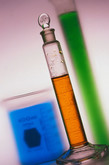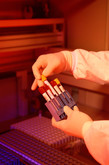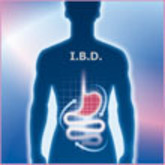Biosimilars
Synthon’s SYD985 outperforms Kadcyla in vitro and in vivo
Synthon announced on 2 April 2014 that its antibody-drug conjugate SYD985 had outperformed Roche’s breast cancer blockbuster Kadcyla (trastuzumab emtansine) in a head-to-head comparison.
First biogeneric for Iran
Iran has developed the country’s first ‘biogeneric’ drug for cancer patients. The announcement was made in the presence of Iran’s Deputy Health Minister Hassan Hashemia at the beginning of February 2014, according to a report in the Tehran Times.
Biosimilar epoetin shows good safety profile in post-authorization study
US-based generics manufacturer Hospira announced on 28 April 2014 positive results from a post-authorization observational safety study of its biosimilar epoetin product Retacrit/Silapo (epoetin zeta) in patients with renal anaemia [1].
Biosimilars applications under review by EMA – April 2014
The European Medicines Agency (EMA) is the body responsible for approval of biosimilars within the European Union (EU). A legal framework for approving biosimilars was established in 2003. Approval of biosimilars is based on an abbreviated registration process, which allows biosimilars manufacturers to provide a reduced package of information compared to originator drugs, provided they can prove ‘similarity’ to the originator or reference drug.
Celltrion files infliximab patent lawsuit in US
South Korean biotechnology company Celltrion filed a lawsuit on 31 March 2014 in a federal court in Massachusetts seeking a declaratory judgement that Janssen Biotech’s (Janssen) remaining patents on the reference drug Remicade (infliximab) are invalid and unenforceable.
Biosimilars for inflammatory bowel disease in Norway
Europe approved its first biosimilar monoclonal antibody Inflectra/Remsima (infliximab) on 10 September 2013 [1]. The biosimilar is now recommended by the Norwegian Drug Procurement Cooperation (LIS) as the first choice, which carries out the procurement for all medicines financed by public hospitals in Norway. Gastroenterologists, however, are cautious about using the biosimilar ‘until more studies of the new medicine have been completed’ [2].
Sandoz advances biosimilars pipeline
Sandoz, the generics unit of Swiss pharma giant Novartis, announced on 28 April 2014 that it had reached several important milestones in the development of biosimilar etanercept, filgrastim and pegfilgrastim.
Biosimilar trastuzumab candidates in phase III development
The introduction of Herceptin (trastuzumab) revolutionalized the treatment of breast cancer. Prior to its introduction there were few treatment options available to women with human epidermal growth factor receptor 2-positive (HER2+) breast cancer.
Biosimilar merger for Epirus and collaboration for Catalent
Mergers and collaborations are still in vogue in the biosimilars arena. The latest firms to announce deals are Epirus Biopharmaceuticals (Epirus), which will merge with Zalicus; and Catalent, which has agreed to a biosimilar development collaboration with Zhejiang Hisun Pharma.
Biosimilar G-CSF safe for mobilization of stem cells
A study into the use of granulocyte colony-stimulating factor (G-CSF) biosimilars for peripheral blood haematopoietic stem cell (PBSC) mobilization has found them to be equivalent to the reference G-CSF [1].













